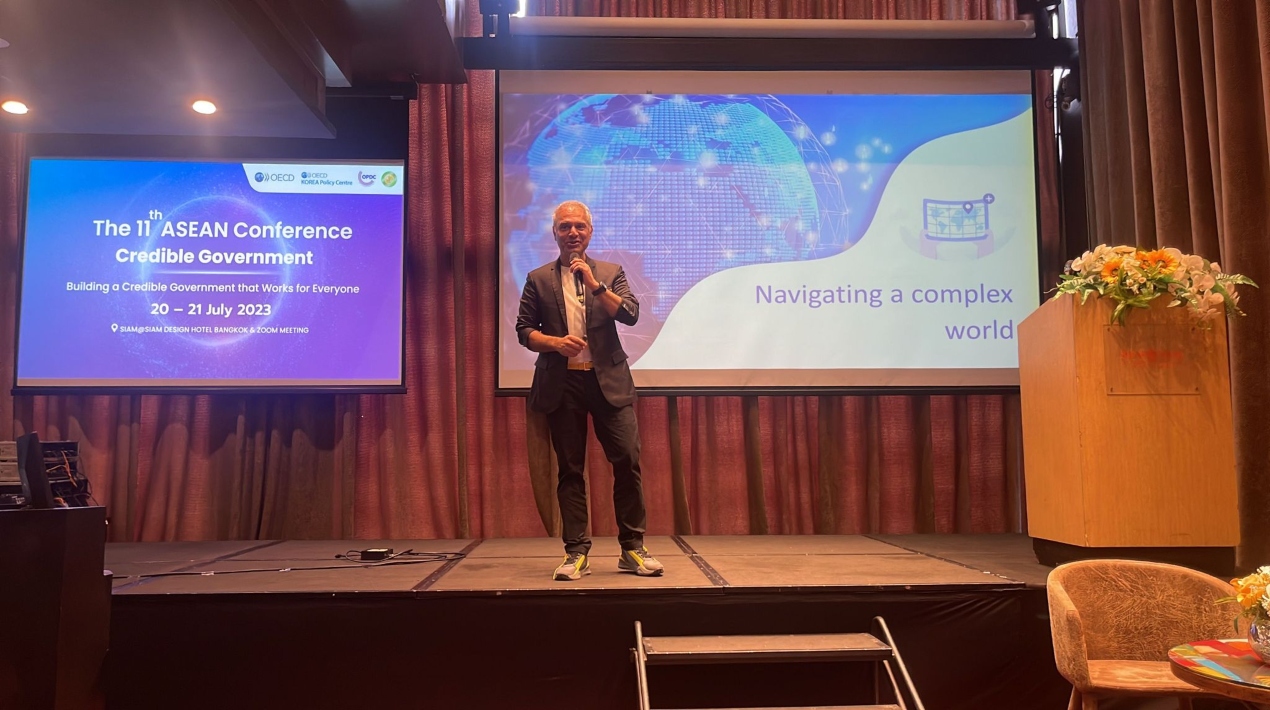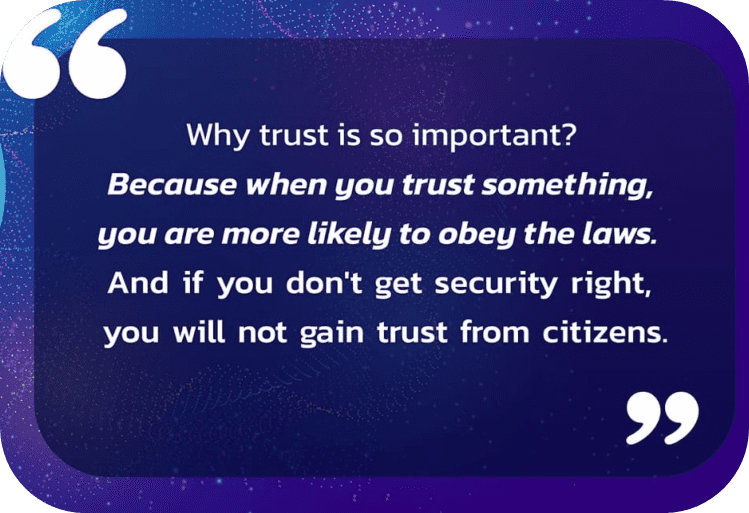
|
Getting your Trinity Audio player ready...
|
During the 11th ASEAN Conference held in Bangkok, Thailand on 21 July 2023, Mohit Sagar, the CEO and Editor-in-Chief of OpenGov Asia, emphasised the importance of open government. He underscored its capacity to bring about transformative changes and stressed the imperative of embracing transparency and collaboration for a more promising future.
Open Government is vital in healthcare, education, financial services, manufacturing and industry sectors. Moreover, a digital platform that fosters collaboration and enables people to learn from one another has to be a part as well.
The ever-increasing complexity of the modern world is something that must be recognised and taken into consideration, especially in light of the profound impact of the pandemic on every aspect of humanity. The role of open government and digital transformation cannot be overstated in navigating these challenges and creating a better future for all.
The impact of both local and international crises has had a significant influence on global interconnectedness. In light of this, the primary emphasis has been on examining the challenges and opportunities arising from the swiftly evolving digital landscape and how it affects the interconnected global community.
“Digital transformation drives innovation, enhances customer experiences, and empowers organisations to adapt to the fast-paced digital age,” Mohit believes.
 Mohit highlighted the crucial role of trust in establishing the legitimacy of any government. When citizens have faith in their government, they are more inclined to acknowledge its authority and accept its decisions, even during challenging periods.
Mohit highlighted the crucial role of trust in establishing the legitimacy of any government. When citizens have faith in their government, they are more inclined to acknowledge its authority and accept its decisions, even during challenging periods.
“The growth of the economy is related to public trust. A dependable government attracts investments, supports entrepreneurship, and fosters stability, which results in economic development,” says Mohit. “Without trust, governments would find it difficult to deliver on their mandates, carry out their duties and enjoy the support of citizens.”
Malaysia and Singapore serve as prime illustrations of nations striving to enhance their governance for the betterment of their citizens. Both countries prioritise the importance of upholding the rule of law and maintaining a citizen-centric approach in their using technology to deliver citizen services.
India, with its vast and diverse population, encompasses a wide range of ideologies and beliefs. While it may not be accurate to claim that there is a single common ideology that applies to every individual in the country, certain cultural and societal values have influenced the mindset of many Indians.
The notion that “every individual is like a CEO or doctor” is one; it implies self-reliance and problem-solving abilities and does resonate with some aspects of Indian culture and upbringing. It is probably why India was able to reinvent itself and cope fairly well in the face of COVID-19.
The cornerstone of successful digital interactions lies in confidence. Users must have faith in the security of their personal information, the integrity of their financial transactions and the reliability of their digital experiences.
The significance of fostering trust through collaborative endeavours is universally acknowledged, recognising that trust is not something acquired immediately, but rather a continuous journey.
“Trust is a foundational element in building a resilient nation and thriving, inclusive economy,” Mohit observes. “But it cannot be built overnight; rather, it requires consistent efforts to prioritise transparency, accountability and ethical practices.”
Governments are well aware that catering to essential requirements is crucial in ordinary situations, and even more so during challenging times. As a result, the public sector has recognised the imperative to utilise technology in order to effectively handle and alleviate critical events.
The significance of digital transformation became evident, especially during the pandemic when novel work approaches to life, work and safety became essential. Work-from-home, e-services, telehealth and online transactions became the need of the hour.
The need for hybrid work models and minimum-contact service/operations has brought about significant changes in the way businesses function. The paradigm shift in thinking has led to the abandoning of traditional norms, and an urgency to exploit technology to overcome challenges faced by the public and private sectors, employers and employees alike.
Against this backdrop, efficient governance is essential. The plethora of disruptions clearly showed the inefficiencies and roadblocks that the pre-pandemic mindset has created. Success now means a far more intentional people-first approach that embraces collaboration and feedback.
In an increasingly digital world, cybersecurity has emerged as a primary concern. In this data-driven landscape, ensuring security and safety is of utmost importance, as it plays a pivotal role in fostering trust, protecting sensitive information, and ensuring the overall welfare of individuals and communities.
Prioritising security is fundamental to building a resilient and trustworthy governance system that puts the well-being of citizens at the forefront. In a citizen-centric approach, where the government places a strong emphasis on meeting the needs and expectations of its people, security becomes even more crucial for several compelling reasons.
Firstly, it is vital for safeguarding citizens’ data from unauthorised access or breaches, ensuring their privacy and confidentiality. Secondly, maintaining robust security measures enhances trust and credibility between the government and its citizens, reinforcing a positive relationship. Thirdly, effective cybersecurity practices are essential for thwarting cyber threats and attacks that could potentially disrupt critical services and compromise national security.
Indeed, in a highly interconnected society that values inclusivity, transparency, and accountability, governments face a myriad of challenges in their efforts to serve and protect citizens. Beyond the standard delivery of citizen services, they must grapple with various complex issues, such as handling natural disasters, addressing climate and environmental challenges, and ensuring the overall well-being of the nation.
To effectively tackle these challenges, governments increasingly rely on data and actionable insights to make well-informed decisions. Data-driven approaches enable them to assess situations accurately, identify patterns, and understand trends, which in turn facilitates the formulation of effective policies and strategies.
By harnessing data, governments can better allocate resources, devise targeted interventions, and respond swiftly to emerging issues, ultimately enhancing their capacity to address the diverse needs of their citizens.
“The rapid advancements in technology have fundamentally transformed the way we live, work, and interact, presenting both unprecedented opportunities and daunting challenges,” says Mohit. “To navigate this complex terrain successfully, organisations and individuals must embrace innovation and cultivate trust in their digital endeavours.”
Innovation propels growth and is essential for staying ahead in a competitive digital landscape. Embracing innovative technologies, processes, and strategies is crucial for businesses to remain relevant and sustainable while meeting the evolving needs of consumers.
Embracing innovation enables development and adaptation, whether through optimising processes with artificial intelligence (AI), creating cutting-edge products to enhance user experiences, or leveraging data analytics for informed decision-making.
As the world embraces digitalisation, Mohit emphasises that transparent governance and data democratisation are crucial for success. The public sector must adopt openness, accountability, and inclusivity, even though altering governance and cultural views can be challenging. However, implementing radical, sweeping changes all at once is not necessary. Indeed, taking smaller steps is a more prudent and effective approach for achieving long-term, sustainable benefits.
In the context of the region, economic growth is intricately tied to emerging technologies like the metaverse and digital/cryptocurrencies, which will have a substantial influence on government policies.
Additionally, the active involvement, engagement, and experiences of citizens, as well as the role of informed opposition, play a vital part in fostering growth and bringing about improvements. These aspects should not be overlooked or underestimated.
To ensure authentic data-driven decisions and incorporate citizen opinions and feedback, government websites and platforms are crucial. Apps and portals that lack effectiveness or usability serve no purpose and are, in fact, a waste of time and resources.
For instance, there exists a government institution with 203 websites, but it fails to meet the demands of its people, compelling them to seek external assistance. Such situations illustrate the importance of prioritising user-centric design and functionality in government digital initiatives to better serve citizens and optimise resources.
Design thinking and user feedback play a vital role in enhancing government services and preventing wasteful spending on ineffective websites and apps. By adopting a user-centric approach, governments can better understand the needs and preferences of their citizens, leading to the development of more efficient and user-friendly digital platforms.
“The importance of sustainability and transitioning to green energy cannot be overlooked if we are to address the pressing issues of climate change and environmental degradation,” adds Mohit.
To overcome the challenges posed by the transition to a sustainable and cleaner future, it is essential for governments, businesses, communities, and individuals to work collaboratively. By embracing green energy solutions, “we can not only mitigate the impacts of climate change but also promote economic growth, enhance energy security, and create a healthier environment for everyone involved”, Mohit is convinced.
In the digital age, the role of government in leading and pushing innovation and data transparency is critical in establishing a progressive and responsible society. As technology advances at an unprecedented rate, governments have an important role in directing and promoting innovation while maintaining data transparency to protect individuals’ rights and interests.
In today’s fast-expanding and hyperlinked world, the necessity of upskilling the existing workforce and fostering collaboration by breaking down silos has become increasingly evident. These two critical pillars are essential for staying competitive, stimulating innovation, and achieving success in a rapidly evolving global landscape.
In the pursuit of a transparent, accountable, and participatory governing system, Mohit emphasises the significance of cultural change and the gradual implementation of principles of openness. Shifting towards accessible and transparent government practices empowers citizens by granting them access to information, data, and the chance to engage in policymaking. This active participation allows citizens to make informed decisions, express their opinions, and take part in shaping policies that directly impact their lives.
This approach promotes evidence-based policymaking that takes into consideration the views of its citizens. As a result, policymakers can make informed judgments relying on trustworthy facts and publicly available data and information. This leads to the formulation of more effective and efficient policies that address genuine social needs, fulfilling the real requirements of the people.
“Open government principles promote transparency, engagement and collaboration between the government and its citizens,” Mohit concludes. “However, achieving meaningful and sustainable change requires a shift in the culture of governance and a thoughtful approach to implementation.”
















